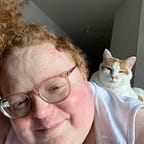Racism + shame = more racism
Brené Brown is a social worker and social scientist who has spent over a decade studying the effect of shame on our lives. She summarizes the most important findings of shame research like this:
The thing to understand about shame is, it’s not guilt. Shame is a focus on self, guilt is a focus on behavior. Shame is 'I am bad.' Guilt is 'I did something bad.' ... Guilt: I’m sorry. I made a mistake. Shame: I’m sorry. I am a mistake.
There’s a huge difference between shame and guilt. And here’s what you need to know. Shame is highly, highly correlated with addiction, depression, violence, aggression, bullying, suicide, eating disorders. And here’s what you even need to know more. Guilt, inversely correlated with those things.
Sending the message that people who believe racist stereotypes or who discriminate are bad people will not make them more thoughtful or kind. It will not turn them into advocates for racial equality. Instead, it will increase aggression, bullying, and violence. It will make people more likely to lash out or shut down. It will make the problem worse.
Shaming people — like talking about "racists" or "bigots" as a vile, contemptible Other — is more likely to increase racism than decrease it. The consequences of acting on our impulse to shame people are damaging. The stakes are high. The research is clear. We need to find another way forward.
Every person needs to be able to affirm their self-worth in order to practice accountability and focus constructively on changing their behaviour. There is no guaranteed way to fix, control, or change other people’s behaviour, but encouraging change starts with empathy and stops dead in its tracks with shame.
Judgment and condemnation are highly normalized in our culture, and most often come from deeply felt pain. Shaming is itself a behaviour that can’t be changed by judging or condemning it. If we want to help lift the weight of shame and prevent its harmful effects, we have to empathize with the emotions that lie behind a person’s impulse to shame. Fighting shame with judgment or condemnation is like fighting fire with gasoline. The only way out is empathy.
If you want to learn more about Brené Brown’s research on shame, her book I Thought It Was Just Me (but it isn’t) and her audio release The Power of Vulnerability are both beautiful works of science and storytelling.
